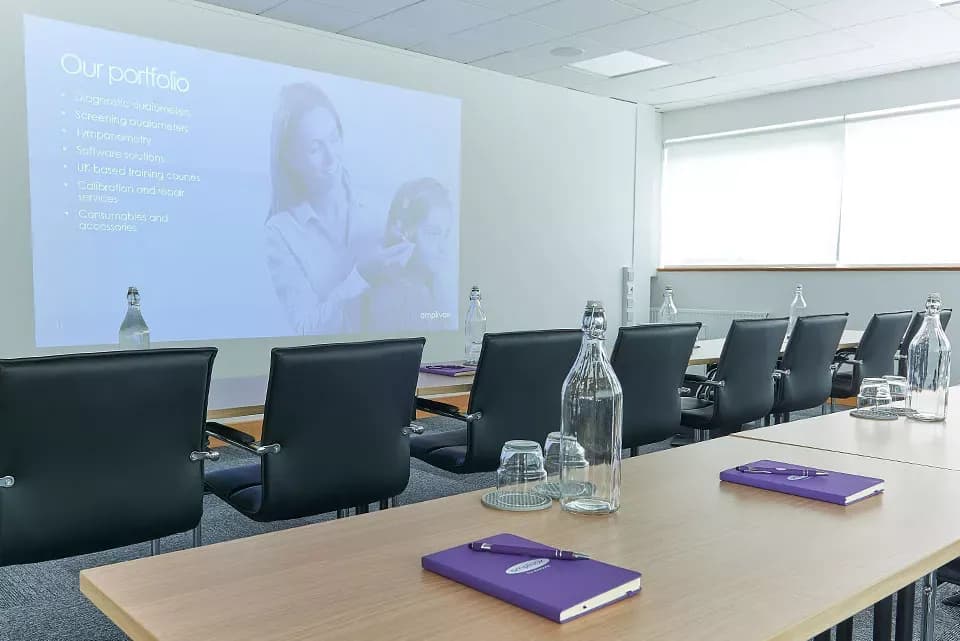
Occupational health training courses
Providing unrivalled knowledge and practical skills for consistent and accurate health screening
Our courses
Whether you’re looking to advance your expertise, refresh your knowledge, or train your team, our audiometry, spirometry and vision screening courses are designed to meet the evolving needs of occupational health professionals at every level.

Audiometry courses
Two-day competency and one-day refresher
Accredited by the British Society of Audiology (BSA) and further developed with the Health and Safety Executive’s (HSE) Control of Noise at Work regulations (2021).

Spirometry courses
One and a half day competency and a one-day refresher
Spirometry courses providing theoretical, practical and interpretational skills to conduct respiratory testing. Ideal for those who require in-depth knowledge to conduct lung function measurements.

Vision course
One-day comprehensive
A comprehensive one-day course incorporating all theoretical and practical aspects of industrial vision screening programmes. Including: vision requirements, screening tests, results analysis, and potential hazards in the workplace.
Regional training
Our expert-led courses are delivered across the UK by our in-house training team, providing focused training away from the workplace. With an excellent delegate-to-trainer ratio, attendees receive personalised support, practical insight, and more opportunities for discussion, ensuring training is engaging, relevant, and effective.
Don’t see a course near you? Let us know, and with enough interest, we’ll bring the training to your area.


Training hub
We recognise the importance of delivering high-quality training in a professional and comfortable environment. Located at our headquarters in Birmingham, we have a dedicated learning facility specifically designed to deliver our occupational health courses, complete with testing room and on-site catering.
In-company training
Whether your team works from one site or many, consistent standards and processes are key to long-term success. Our on-site training is tailored to your internal procedures, ensuring clarity, consistency, and confidence across your workforce. By aligning training with your operational practices, we help teams work more effectively together, even across multiple locations.
Frequently asked questions
What are the benefits of attending our courses?
At Amplivox, our courses are designed to keep occupational health professionals up to date, confident, and progressing in their careers. Covering the latest practices, technology, and standards, our training supports continuous professional development and helps prevent skills stagnation.
Our independently accredited courses provide CPD points and support SEQOHS requirements, enabling delegates to demonstrate professional credibility and deliver high-quality occupational health services.
We also create opportunities for networking and collaboration, bringing together professionals to share insights, exchange ideas, and build valuable professional connections.
Who are our courses for?
Developed specifically for occupational health professionals, our courses are suitable for all experience levels, from seasoned occupational health and primary care professionals, to those new to the role.
Each course combines expert-led theory with hands-on practical sessions. Ensuring delegates can confidently apply their skills in real-world settings, delivering accurate, consistent, and standardised health screening.
Is occupational health training a legal requirement?
Occupational health training may not always be a legal requirement, but it plays a vital role in protecting employee health and safety. Employers have a legal duty of care, and appropriate training is a key part of meeting that responsibility.
In some roles and industries, such as those involving hazardous substances or health surveillance activities like audiometry and spirometry, training is required to meet regulatory standards.
Even where it isn’t mandatory, accredited training is recognised as best practice, helping maintain professional standards, support workplace safety, and ensure the delivery of high-quality occupational health services.
Are our courses accredited?
Our courses are CPD accredited by the CPD Standards Office, and BSA accredited for our 2-day Surveillance Audiometry training.
This ensures your training counts towards Continuing Professional Development, meets recognised national standards and is aligned with industry guidance, including:
- British Society of Audiology (BSA) for Audiometry
- Health & Safety Executive (HSE) INDG343 & L108
Why accreditation matters
Attending a course that’s accredited by recognised bodies such as the British Society of Audiology (BSA) and the CPD Standards Office is important for several reasons:
- Ensures the training meets recognised professional standards
- Provides credibility and assurance that the content is accurate and up to date
- Recognised and trusted by employers and industry bodies
- Supports career development and strengthens your professional profile
- Helps ensure legal and best-practice compliance in occupational health
- Guarantees structured learning with clear, measurable outcomes (CPD)
- Builds trust and reinforces your professional reputation
- Protects you from low-quality or unrecognised training providers.